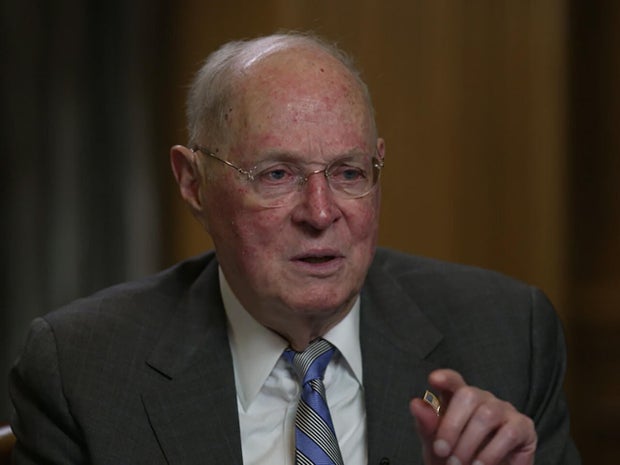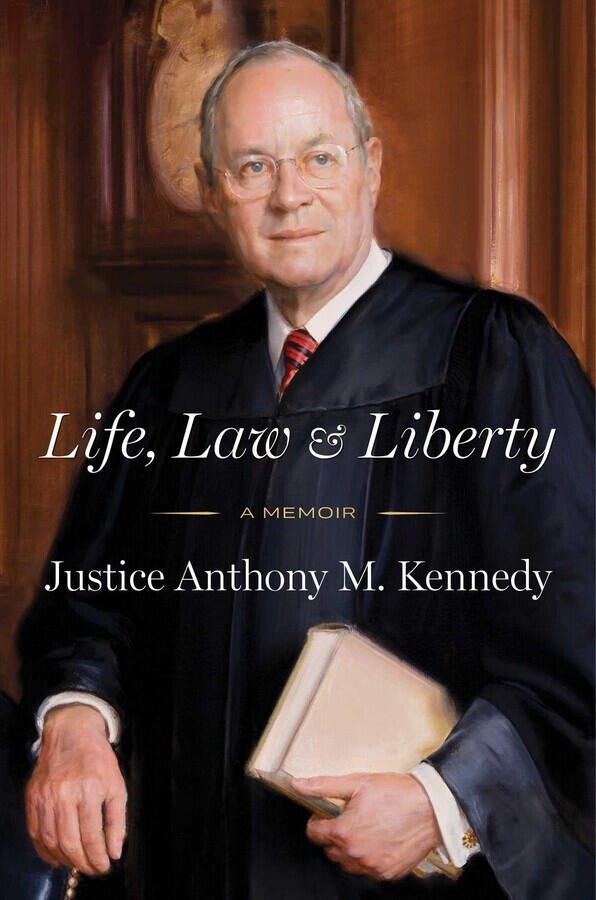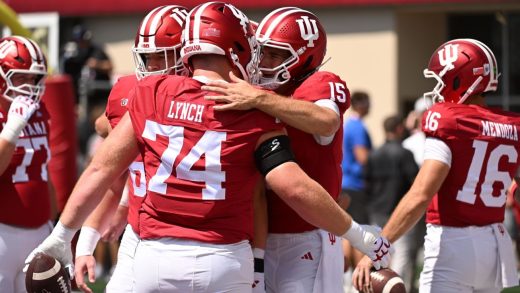Former Justice Anthony Kennedy loves to show guests around his art-filled chambers, but beneath that gentlemanly charm is the steel that once made him a force on the Supreme Court. He showed a visitor a statue of the Pony Express: “And when Ronald Reagan was Governor, and he saw it and loved it, I said, ‘You’re not Queen Mary. I don’t have to give it to you!'”
Kennedy, now 89 years old, no longer hears Supreme Court cases. He formally stepped down seven years ago during the first Trump administration. “I loved sitting on the bench,” he said.
Asked whether he would want to be there today, he replied, “The only reason I left – I love the Court – but I left for something that I love more, which is my wife, Mary.”
CBS News
Kennedy now has time for his wife and family – and time to look back. In a new memoir, “Life, Law & Liberty” (to be published Tuesday by Simon & Schuster), Kennedy details how growing up in the West shaped his remarkable legal career, from private practice and teaching law in Sacramento, to sitting on the highest court in the country.
“I was born in the West and embraced that Western spirit,” he writes. “Sacramento is where my thinking began about equality, liberty and freedom.”
Asked if he ever imagined himself sitting on the Supreme Court, Kennedy replied, “No, or on any court in fact. My father was a solo practitioner, and I took over his solo practice. Actually it took over me. And I had no time to see the kids growing up.”
So when then-Governor Ronald Reagan asked Kennedy if he would be interested in a federal judgeship, he said yes. “President Ford had asked him who his recommendation would be, and it seemed to me a good way to be able to spend more time with my family,” he said.
Simon & Schuster
At just 38 years of age, Kennedy became the youngest judge on the 9th Circuit Federal Court of Appeals, but soon discovered that sitting on the bench had its own challenges. Just months after Kennedy was sworn in, Lynette “Squeaky” Fromme was charged with the attempted assassination of President Gerald Ford. Judge Kennedy presided over her bail hearing. “Because I was the circuit judge and happened to be in Sacramento that day or that week,” he said. On the question of whether Fromme should be allowed bail, Kennedy said, “It took me probably ten seconds to decide no.”
But just days later, Kennedy says his home in Sacramento was broken into and vandalized. And though he couldn’t prove it, he always suspected there was a link. “It was terrifying,” he said. “Fortunately our U.S. marshals are very good, and nothing happened.”
More than a decade later, Reagan – now president – reached out again, this time with a vacancy on the U.S. Supreme Court. Reagan’s first pick, Robert Bork, had been rejected by the Senate, and his second, Douglas Ginsburg, had dropped out. Kennedy, the third choice, said yes, and was unanimously confirmed by the Senate.
Professor Jamal Greene, who teaches constitutional law at Columbia University, said, “I think you could make an argument for saying that Justice Kennedy, in his time, was the most influential justice, maybe even in the history of the Court.”
Greene got to know Kennedy in 2006 while clerking for another justice on the Court, John Paul Stevens. “He definitely was a bit of an iconoclast in the sense that he sometimes went with the conservatives, but very often went with the liberal bloc as well,” Greene said.
And as the “swing justice” on the Court, says Greene, Kennedy cast the deciding vote on some of the most consequential political and cultural issues of his era: the 2000 Presidential election, gun ownership, abortion rights, and same-sex marriage.
Greene said, “One way of measuring that is, the year I was on the Court, there were 25 5-4 decisions, and Justice Kennedy was in the majority in every single one. And there’s certainly no one else who came close to that.”
Kennedy did not take his power lightly. A devout Catholic, he considered resigning from the Court in 1992 while deciding Planned Parenthood v. Casey, but ultimately joined with liberal justices to uphold a woman’s right to an abortion.
He said, “It just seemed to me that this was the woman’s right, and that what people of my belief should do is to convince her not to have the abortion, to convince her … but that she should have the right.”
Kennedy also wrote the decision in 2015 that recognized same-sex marriage, Obergefell v. Hodges: “No union is more profound than marriage, for it embodies the highest ideals of love, fidelity, devotion, sacrifice, and family.”
Kennedy said, “Someone told me it passed the refrigerator test, [which means] if there’s something that’s interesting and well-written, you put it on your refrigerator.”
All of Kennedy’s opinions, says Greene, reflect a common theme: “If you saw a Supreme Court opinion and saw the words ‘freedom’ and ‘liberty’ in the first paragraph, you could be pretty sure that Justice Kennedy was the person who had written that,” he said.
But since Kennedy stepped down, Greene says, his legacy has begun to fade. In 2022, the Supreme Court (including two of his former clerks, Neil Gorsuch and Brett Kavanaugh) reversed Roe v. Wade, ending the federal right to abortion. In his opinion in Dobbs v. Jackson Women’s Health Organization, Justice Samuel Alito wrote that the decision behind Roe v. Wade was “egregiously wrong,” and that the opinion Kennedy wrote in Planned Parenthood v. Casey “perpetuated its errors.”
To which Kennedy says, “I stand by what we wrote and what we decided. It’s a difficult issue.”
He also noted it is quite infrequent for the Court to overrule one of its own decisions.
It may not be the last Kennedy opinion that’s reversed. A petition has already been filed asking the Court to reconsider the case that legalized same-sex marriage, Obergefell v. Hodges.
Today, Kennedy spends a lot of time with his own “nine” – his grandchildren – and while he is careful not to criticize the current justices, he admits he worries that some members of the Court may be too public with their differences: “I’m actually somewhat concerned about the Court,” he said. “It’s a little bit too personal and confrontational, some of the opinions. I’m hoping that will settle down a little bit.”
I asked, “You do write a lot about how important civility is, and ethics. Do you think we’ve lost sight of that today? Is that another reason why you wrote this book?”
“Yes, I’m concerned,” he replied. “Democracy presumes an open, rational, thoughtful, decent discussion where you respect the dignity of the person with whom you disagree. And if it doesn’t have that, then democracy as we know it is in danger.”
READ AN EXCERPT: “Life, Law & Liberty” by Justice Anthony Kennedy
For more info:
Story produced by Mary Raffalli. Editor: Remington Korper.



